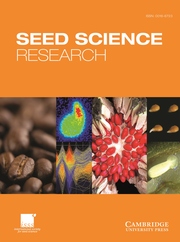Article contents
Lipid mobilization, gluconeogenesis and ageing-related processes in dormant walnut kernels during moist chilling and warm incubation
Published online by Cambridge University Press: 01 June 2009
Abstract
To understand the beneficial effects of cold conditions during the alleviation of dormancy of walnut (Juglans regia L.), lipid mobilization, gluconeogenesis and changes related to ageing were compared in dormant kernels incubated in the cold and under deteriorating warm conditions. Stratifying kernels at 5°C for 30 d enhanced their germination capacity, whereas warm-incubated (27°C) kernels turned rancid after 20 d and had reduced germination. Kernel imbibition was sufficient to bring about lipid mobilization, irrespective of temperature of incubation. Although imbibed kernels displayed high isocitrate lyase activity, starch and soluble sugar accumulation occurred only under cold conditions. Deteriorative 64 kDa fatty acyl-ester hydrolase activity declined in cold-stratified kernels. Cold treatment also led to reduced lipid peroxidation and hydrogen peroxide in kernels. The activity of NADP+-isocitrate dehydrogenase, an NADPH-generating enzyme, declined in warm-incubated kernels. Thus, warm-incubated kernels undergo ageing associated with oxidative stress, but there are beneficial effects of cold stratification in preventing deteriorative ageing-related processes. Imbibition is sufficient to allow lipid mobilization to occur in dormant walnut kernels, although cold stratification accompanied by gluconeogenesis is essential for kernel germination.
Keywords
Information
- Type
- Research Article
- Information
- Copyright
- Copyright © Cambridge University Press 2009
References
- 11
- Cited by

